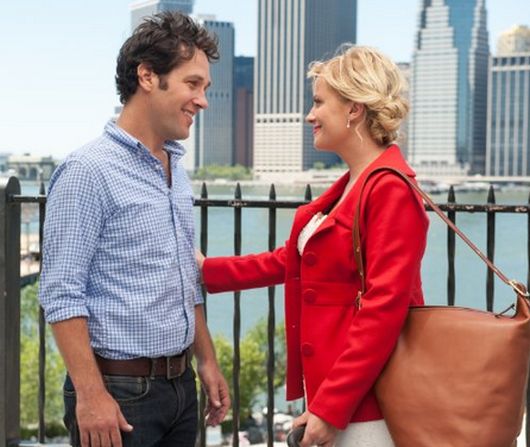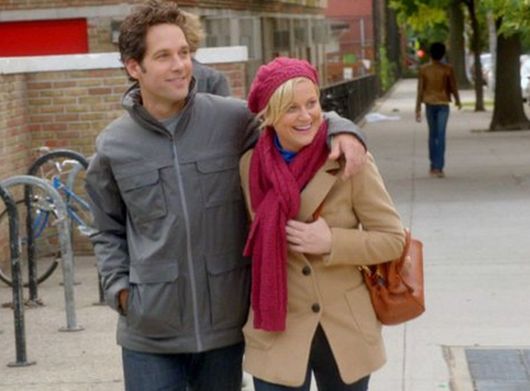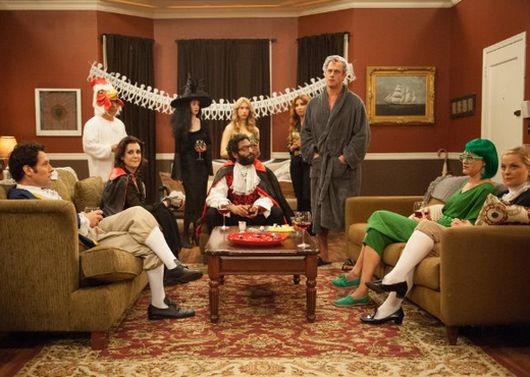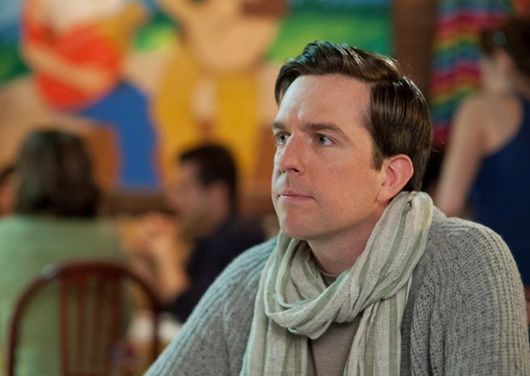 TV
TV In Which Ladel Ourselves Wet Fan Service
 Friday, August 14, 2015 at 10:49AM
Friday, August 14, 2015 at 10:49AM 
God & Jon Hamm
by ELEANOR MORROW
Wet Hot American Summer: First Day of Camp
creators Michael Showalter & David Wain
It was right before Christmas in the year of our lord 1993 that The State debuted on MTV. Sketch comedy was previously the province of the old; Steve Martin was already in his late 60s by this time, and dating women a mere forty years younger. People still thought Eddie Murphy was hilarious. Non-Seinfeld based comedy as we know it was largely based around puns and the crankiness of Tim Allen's fictional wife Jill (Patricia Richardson). No one was sure what exactly was funny, or why. For some reason, people even found Chevy Chase amusing, or pretended to.

There was nothing to laugh at before The State came on the scene, and Wet Hot American Summer was basically a reunion show for the sketch comedy series that influenced so many young people of every profession. Did it matter that Ken Marino was now in his early forties and that apparently no one liked Kevin Allison enough to invite him back for this project? No. All that mattered is that we could laugh again.
The State's breadth was stunning, and its innovation fantastic — even its worst sketches were so mind-numbingly bizarre that they became even more humorous in retrospect thinking of the idea that MTV allowed them to air on cable television. Most older comedy shows just sit like lumps; quickly becoming dated because of a topical humor that is only understood in context. The State was nothing like that — those of its concepts which did not resonate at the time are now retrospectively funny twenty years later.
The one thing The State constantly avoided being was fan-service. Instead the half-hour show delivered what you did not expect, usually without incorporating profanity or lame cameos from more famous performers as surprises. The fact that it did not have to appeal to any extant audience is what allowed it to exist on its own terms. Well, all of that is flushed down the toilet with Wet Hot American Summer: First Day of Camp.
The original cast of the film looks surprisingly spry in this short Netflix series, with even David Hyde Pierce seeming like he has been in cryogenic sleep since Frasier. Only Showalter himself looks meaningfully different from his original character. I was watching First Day of Camp with a friend of mine whose idea of comedy is Sam Waterson playing gay, and she asked me to explain what the joke was here. "So they were old too old to play campers? And now they're still too old?" I nodded and focused my eyes on the tiny tee-shirt worn by Gerald "Coop" Cooperberg (Michael Showalter).

One of the most embarrassing things Roger Ebert ever wrote was his review of the original movie. None of the jokes resonated for him at all, probably because he was a generation older than any of the writers or performers in the film. He should have at least appreciated the lush, colorful aesthetic that David Wain has made his signature style. No one does a better closeup in this industry, and the broad array of talent is so wonderfully directed that even Chris Pine comes off as a magnificent performer.
First Day of Camp is a prequel to the original film. Coop has arrived to meet up with his girlfriend Donna (Lake Bell), who seems more interested in visiting Israeli counselor Yaron (David Wain). A camp production of the musical ElectroCity pairs theater counselor Susie (Amy Poehler) and dessicating Broadway character actor Claude (John Slattery). A subplot involving the government dumping chemical waste near the camp allows camp directors Greg (Jason Schwartzman) and Beth (Janeane Garofalo) a romantic interlude and explains how Jonas (Christopher Meloni) became Gene, the disturbed camp cook of the original film. Lastly, reporter Lindsay (Elizabeth Banks) goes undercover as a counselor to get a story about reclusive musician Eric (Chris Pine).

What exactly is First Day of Camp missing? It is almost completely composed of fan service, but that is not really the problem. Opening up the universe to amusing scenes filmed in New York in the office of magazine editor Alan (Jordan Peele) adds something different to the experience, even if characters like John Slattery's lecherous veteran actor, Jon Hamm's government assassin The Falcon and Michaela Watkins' lecherous choreographer fall a bit flat.
Wet Hot American Summer: First Day of Camp is such great fun it seems silly to ask for anything more. But extended scenes set at David Hyde Pierce's university or the courtroom of attorney Jim Stansel (Michael Cera) remind us of how exciting it would be to see a new comedy set in this wild universe instead of the familiar summer camp drama.
Demanding our most serious comedic talents revisit the scenes of their finest successes led to Beverly Hills Cop 3. Sure, without the comfort of the characters that proved so successful in the original film, Wet Hot American Summer: First Day of Camp would be an inconsistent mix of brilliant satire and completely bizarre flops (still not sure what Showalter was going for with his performance as Ronald Reagan), but that was pretty much The State. At least it wasn't content to trod out the same characters again and again, looking to resurrect whatever bit of genius captured the imagination the first time. Instead they moved onto the next thing.
Eleanor Morrow is the senior contributor to This Recording. She is a writer living in New York.

"You're Mine (The Chase)" - Meiko (mp3)
"Oh My Soul" - Meiko (mp3)
















































